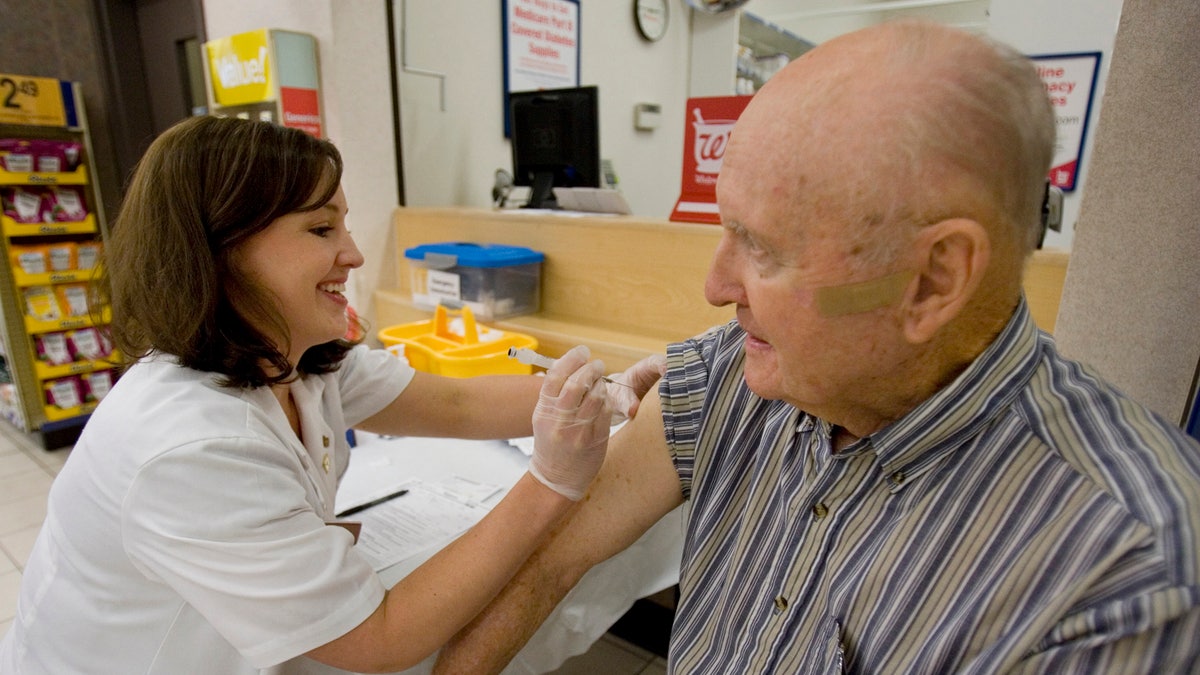
Maurice Brannon, 88 of Columbia, S.C. get his seasonal flu shot from Walgreen's pharmacy manager, Whitney Workman Tuesday, Sept. 1, 2009, in Columbia, S.C. (AP)
Countries are close to a deal to speed up their response to the next flu pandemic by sharing virus samples in return for access to affordable vaccines, diplomats at the World Health Organization said on Tuesday.
Diplomats told journalists they were in talks with drugs companies and other member states to clear obstacles identified in past outbreaks.
Officials are hoping to reach an agreement by Friday on a political deal for health ministers to approve at the WHO's annual meeting from May 16 to 24, said the two co-chairs of a WHO working group.
Negotiations began four years ago between the WHO's 193 member states after the deadly H5N1 bird flu virus emerged in southeast Asia.
A year later, Indonesia stopped sharing flu virus samples with the WHO's network of laboratories, demanding its share of vaccines.
"We have to ensure that vaccines are both affordable and accessible," Mexico's ambassador and co-chair Juan Jose Gomez Camacho, told a news briefing.
"We need to ensure that we have a legally-binding instrument that will regulate the exchange of influenza viruses and the access to benefits ... This should be the last round of negotiations," he said.
Gomez Camacho and co-chair Norway's Ambassador Bente Angell-Hansen said they met senior officials from 30 drug companies last week, including GlaxoSmithKline , Sanofi-Aventis and Novartis .
They said they learned that current production capacity for pandemic flu vaccine was 1.1 billion doses, forecast to rise to 1.8 billion in four to five years. That was up from 500 million doses during the H1N1 pandemic.
Drug makers struggled to make a vaccine against H1N1 after it emerged in early 2009. By the time the vaccine was widely available late that year, the pandemic's first wave had passed.
POSITIVE SIGNALS FROM INDUSTRY
"We are being very, very careful in the handling of this because there are many sensitive issues that pertain to pricing and intellectual property," Angell-Hansen said.
"We are trying to have a more predictable system for pandemic times," she added. "Industry is really giving very positive signals back to us."
Gomez Camacho said countries needed to coordinate policies and cut red tape.
"There were vaccines available (in 2009), either in the market or donated by the industry to WHO, and very often these vaccines were not able to be deployed, sometimes because there wasn't infrastructure in countries or there were regulatory challenges," he said.
WHO Director-General Margaret Chan, in a speech last month, blamed the pharmaceutical industry and drug regulators for delays in distributing vaccines to poor countries during the H1N1 swine flu pandemic.
The working group's draft document calls for having deals in place ahead of a pandemic, including pre-purchase agreements with industry and governments to reserve a certain percentage of production capacity, for example 10 percent, earmarked for countries without access to vaccines.
